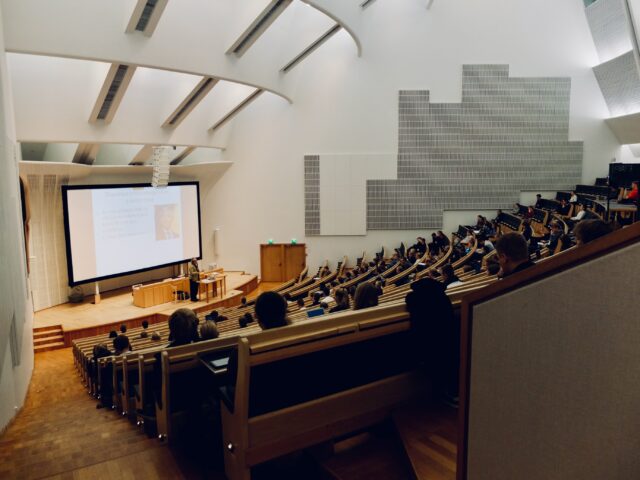Keyano College and the University of Alberta have collaborated to bring UAlberta’s Master of Education in Educational Studies (MES) to the northeast Alberta region. Students taking the program in Northeast Alberta will learn about new developments in contemporary learning theories and practices as they complete courses in topics such as educational research findings, school operations, and resources management. The program follows the , which facilitates diversity in learning environments. The program is anticipated to begin in Winter 2024.

Top Ten News
August 10, 2023
Northern College has reportedly rescinded admission offers to over 500 international students. Nicholas Keung of the Toronto Star reports that the offers were rescinded after the visa approval rate turned out to be higher than anticipated, leading to a situation where Northern’s campuses were “oversubscribed.” “We were not quite prepared to manage that much of an increase in the number,” said Northern President Audrey Penner. The college has reportedly offered refunds and the option to transfer to other colleges. Advocates and groups such as the World Sikh Organization of Canada (WSO) have spoken out against the college’s decision and called on the federal and provincial governments to intervene.
The Council of Nova Scotia University Presidents (CONSUP) has announced that four Nova Scotian universities have joined the ARUCC MyCreds’ National Network: Dalhousie University, the University of King’s College, Université Sainte-Anne, and Mount Saint Vincent University. Students from these universities will be able to use MyCreds’ to share their academic documents securely. This is the first project that has emerged from CONSUP’s Post-Secondary Education Solutions strategy and the project is supported by EduNova and the provincial government. Other NS institutions”Acadia University, the Atlantic School of Theology, Cape Breton University, NSCAD University, St Francis Xavier University, Saint Mary’s University, and Nova Scotia Community College”are expected to join MyCreds’ in the coming months.
While scientific misconduct has “enjoyed some limelight lately” in the news, Retraction Watch co-founders Ivan Oransky and Adam Marcus report that “the academic world still seems determined to look the other way.” Oransky and Marcus write that retractions have risen sharply in recent years as volunteers search for anomalies and publishers fight back against paper mills. However, the authors estimate that at least 100,000 retractions should occur each year, which indicates that the rate of retractions”about 5,500 a year”is still an undercount of misconduct and fraud. Oransky and Marcus outline the factors that contribute to this issue and call for improved funding to detect and sanction research fraud.
Lethbridge College has launched its third degree program: The Bachelor of Criminal Justice program. The two-year degree program will help recent diploma graduates to develop their skills in critical thinking, conflict resolution, ethical decision-making and more. It will include classroom theory as well as opportunities to participate in work-integrated learning and applied research project. Graduates will be prepared for careers in areas such as policing, human services, victim advocacy, and corrections and border security. This degree will replace Lethbridge’s Justice Studies — Bachelor of Applied Arts program.
The Government of Ontario has announced that it is investing $3.6M into free construction worker training for women and young people. The funds will support free programs that are led by the Provincial Building and Construction Trades Council of Ontario (PBCTCO). The programs include three projects: The first will aim to increase female participation in the industry by training 700 tradeswomen, the second will provide 1,500 jobseekers with online training tools and exclusive employment opportunities so they can explore the skilled trades and find apprenticeship opportunities, and the third will provide hands-on learning and training opportunities to grade 12 students in London and Ottawa.
Universities Canada has prepared a statement for the Government of Canada’s pre-budget submissions that urges the federal government to make critical investments in people, ideas, and communities. The three main recommendations in the submission are: To attract, develop, and retain talent; to strengthen research excellence and competitiveness; and to build healthy, green, and accessible communities. “In the global competition for talent, Canada must take urgent measures to keep up,” said Universities Canada Interim President Philip Landon. “Canada’s future depends on investments in developing and attracting skilled talent, strengthening research excellence and building healthy, green and accessible communities.”
A recent article from discusses the dire situation faced by postsecondary students in need of housing. The University of Calgary, Southern Alberta Institute of Technology, and Mount Royal University have waitlists of 740, 100, and 50 students, respectively. MRU states that the demand is unprecedented, as the university has not had a waitlist for on-campus housing before. UCalgary is tackling the issue with a variety of initiatives, including offering landlords the opportunity to post on a student rental website for free, helping students find off-campus accommodations, and running ad campaigns to inform Calgarians about the situation. UCalgary’s student union is calling for the Calgary city council to approve all recommendations from the Housing Affordability Task Force.
Université Sainte-Anne and Acadia University recently announced a new educational cooperation agreement focused on languages and modern literature. The three-year agreement will allow USainte-Anne student to access Acadia’s foreign language courses in exchange for Acadia students being able to access USainte-Anne’s French language literature and linguistics courses. Students will be able to take part in courses in a face-to-face or bimodal format from a multimedia classroom on their home campus. USainte-Anne Vice-Rector Martine Béland explained that the project was born from the desire to bring each university’s institutional strengths to their student populations.
McGill University has reopened the Schulich Library of Physical Sciences, Life Sciences, and Engineering after significant structural repair and restoration work. The library has been closed for work since 2019. The library features study spaces equipped with new technology, dedicated quiet zones and collaborative areas, and more gender-neutral and women’s washrooms on each floor. A new health and wellness seating area has been added and the library boasts new windows, flooring, ceilings, and lighting. The university will be completing the library with new landscaping”including perennials, shrubs, and outdoor seating”later this month.
